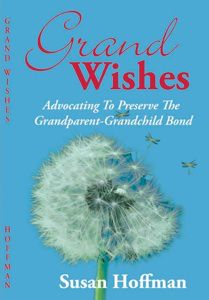Banned forever! “One slip of the tongue cost us our granddaughter”
Banned forever! “One slip of the tongue cost us our granddaughter”
By Susan Hoffman, for GRAND Magazine
NABBW’s Grandparenting Expert
“On the surface our life looked perfect, but behind closed doors our family was falling apart. A feeling of emptiness and heartache consumes us because of our lost access to our little granddaughter. Not a day goes by when I don’t think of her.
“My DIL [daughter-in-law] Beth and I used to be so close: She and I would make tufa pots in her yard, go to nurseries looking for plants to put in them, show and sell our final products locally. We had a lot of fun. She and my son lived nearby, making get-togethers all the more convenient. They came to Mexico for visits, skied in Colorado with us, ate dinners out; and then we shopped for baby clothes together.
“One day everything changed. I still play it over and over in my head trying to figure out what exactly happened to completely sever all ties between us. What did I say or do in the backyard that summer day to make her and my son so mad that now we are forever banned from their lives and from our young granddaughter?
“Our calls and e-mails went unanswered, so on Easter morning a few weeks later, my husband and I went to the house to deliver a basket for our granddaughter. When our son answered the door, he was fuming as he glared at us and then refused to accept the Easter basket. He admonished us for coming over unannounced and told us to stay away. We were in shock.
“From that day on there was no further communication from our son or his wife. We didn’t give up though; we sent heartfelt letters, “thinking of you” cards, gifts, and even hired a mediator — nothing worked. The gifts and cards were never acknowledged, nor were they returned.
“It has been almost three years since we have had contact of any kind, which amounts to almost half of our granddaughter’s life since we have held her, played with her or talked to her. We sent Presley a birthday card last week, but who knows if they even opened it. One time I saw her from a distance as she came out of her school; it was wonderful to see her, but it made me sad.
“Coincidentally, we live just three blocks from them, but it may as well be 3,000 miles. There have been a few awkward moments when we have passed them in our car or on bikes, not sure what to do — we just waved and kept going. Our reasoning is that if they don’t see us as a threat, maybe they will let us back into their lives. That is our hope.
“Keeping up a façade can be exhausting. One day my neighbor asked, “Where is your son? I haven’t seen him in a while.” I reluctantly admitted that somehow Dave has the notion that we did not accept his wife into the family and therefore, decided to distance himself; we can only ascertain this information secondhand, as he no longer speaks to us. My neighbor was not shocked: He then shared his story about how his daughter had not been around for 15 years. He went on to say the daughter wrote them once stating that she would reconsider allowing them back into her life and let them see the grandkids if they sent $50,000.
“Susan, at first it was embarrassing to tell anyone, especially since I thought that I was the only one this was happening to. As time went by, it seemed everyone had a similar story. I no longer felt alone.”
—Alienated Grandma Laura
Susan responds:
Laura’s experience is a heartbreaker, and she’s right: It’s happening to families everywhere. Talking about it brings great relief to disenfranchised grandparents. Talking about it to other grandparents experiencing similar circumstances can be a godsend. Once we learn that we are not alone and that this is happening to many others, then we no longer have to endure the suffering in silence. It lightens the load and lessens the stress.
It is humiliating to admit that our own children can be so cruel and that they are treating us with such contempt to the point that we have been locked out of their lives. We all want to be proud parents and then look forward to enjoying the rewards that go along with grandparenthood — and when it all crumbles, then we ask ourselves: “Where did I go wrong as a parent?”
While it is natural to blame ourselves, at some point we need to let go of the guilt we harbor and realize it is the adult children who have made these choices and may very well need to take ownership for their behavior.
Visitation issues hover over many families and sometimes never surface, and this may be attributable to the temperament of personalities or perceptive intervention of those heading it off at the pass before it becomes a problem. My friend refers to her DIL as “THE LAW.” She saw it coming and has taken preventative measures by adapting her own behavior so she can remain within the acceptable boundaries. This may sound rigid, but that is the world we live in; if grandparents want a free pass, then they must follow the rules.
All it takes is a slip of the tongue before there is an unintended consequence, and suddenly a switch goes off and grandparents find themselves on the outside looking in. There is no room for egos or the need to be right. The parents hold the keys to the kingdom, and they are in control. Without them, there is no visitation, especially when the family is living in an “intact” situation (such as Laura’s). Although every state does have grandparent visitation statutes, few include the “intact” criterion, (standing to file a petition when the parents are married and living together). In these situations, grandparents must rely on their own resources, including support from others rather than legal avenues.
“Unreasonably denied” visitation has become a growing social problem affecting many families. Everyone suffers, especially the child who doesn’t understand and feels abandoned when the attachment has been broken, along with a loss of affection. It is a form of emotional child abuse, so it is the grandparents, by lending their voices on behalf of a child, who are finally speaking out and setting themselves and all of the skeletons in the closet free.
Susan Hoffman is director of the 501(c)3 Advocates for Grandparent Grandchild Connection and author of Grand Wishes: Advocating to Preserve the Grandparent-Grandchild Bond.
Reprinted with permission by GRAND Magazine (Sept/Oct 2010). Click on this link http://bit.ly/GRANDMAG to receive a free subscription to GRAND, the Online Magazine for GRANDparents ($19.95 value – 12 issues) compliments of NABBW. You\’ll get instant access to the current issue and archives.




Leave a Reply
You must be logged in to post a comment.